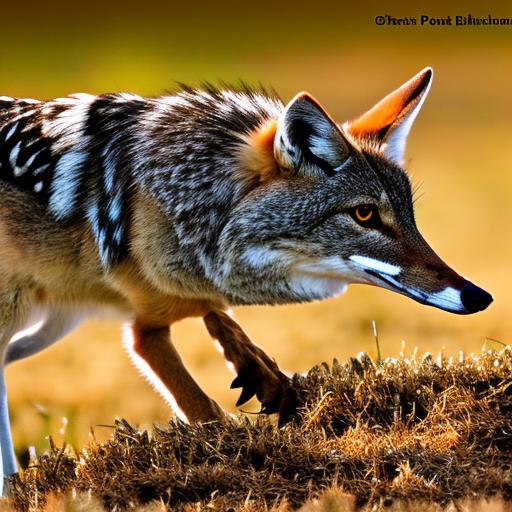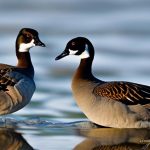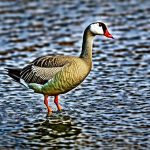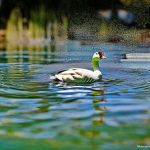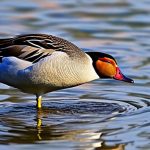The relationship between coyotes and geese is a fascinating one that highlights the delicate balance of nature. Coyotes are natural predators of geese and play an important role in controlling their population. Understanding this relationship is crucial for maintaining a healthy ecosystem and ensuring the coexistence of these two species.
Key Takeaways
- Coyotes are natural predators of geese and play a crucial role in controlling their population.
- The benefits of coyotes keeping geese away include reducing damage to crops and preventing the spread of disease.
- Geese have a significant impact on the environment, including altering vegetation and water quality.
- Geese can also have negative effects on human life, such as causing airplane accidents and creating noise and waste pollution.
- Coyotes play a vital role in maintaining ecological balance and should be coexisted with and respected as part of the natural ecosystem.
Coyotes as Natural Predators of Geese
Coyotes are opportunistic predators and have adapted to a wide range of habitats, including urban areas where geese often reside. They are skilled hunters and have developed strategies to catch their prey, including geese. Coyotes primarily hunt geese by stalking them and using their speed and agility to chase them down. Once they catch their prey, they will typically bite the neck or head to kill it.
How Coyotes Control the Goose Population
Coyotes play a vital role in controlling the goose population. By preying on geese, they help keep their numbers in check and prevent overpopulation. This is important because an overabundance of geese can lead to various ecological issues, such as habitat degradation and competition for resources. In areas where coyotes are present, they have been successful in reducing the goose population and maintaining a healthier balance in the ecosystem.
The Benefits of Coyotes Keeping Geese Away
Having coyotes keep geese away can have several benefits for both the environment and humans. Firstly, it helps maintain a healthy ecosystem by preventing the overgrazing of vegetation by geese. Geese are known to consume large amounts of grass and other plants, which can lead to habitat degradation and loss of biodiversity. By keeping geese away, coyotes help preserve the natural balance of plant and animal species in an area.
Secondly, coyotes can help reduce conflicts between humans and geese. Geese can be a nuisance in urban areas, causing damage to property, creating noise pollution, and posing health risks due to their droppings. Having coyotes around can deter geese from settling in these areas, reducing the problems they cause for humans.
The Impact of Geese on the Environment
Geese can have a significant impact on the environment, particularly when their population becomes too large. One of the main issues is overgrazing. Geese feed on grass and other vegetation, and when their numbers are high, they can strip an area of its vegetation, leading to habitat degradation. This can have cascading effects on other species that rely on the same vegetation for food and shelter.
Another impact of geese on the environment is water pollution. Their droppings contain high levels of nutrients, such as nitrogen and phosphorus, which can enter water bodies and cause algal blooms. These blooms deplete oxygen levels in the water, leading to fish kills and other negative effects on aquatic ecosystems.
The Negative Effects of Geese on Human Life
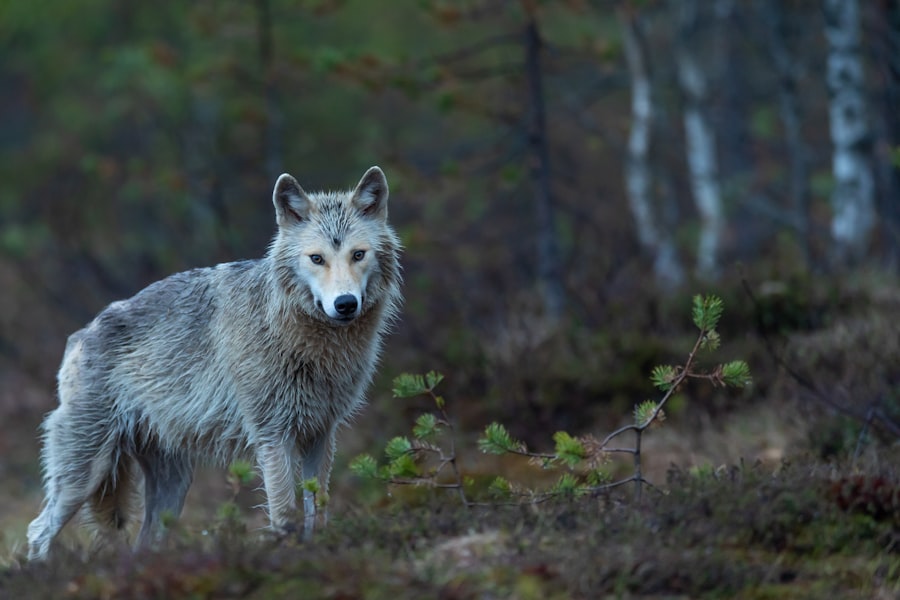
While geese are beautiful creatures to observe in nature, they can also cause problems for humans. In urban areas, geese often congregate in parks, golf courses, and other public spaces. Their droppings can create unsightly messes and pose health risks due to the presence of bacteria and parasites. Additionally, geese can become aggressive during nesting season and may attack humans who come too close to their nests.
Geese can also cause damage to agricultural crops. They feed on young plants and can destroy entire fields if left unchecked. This can result in significant economic losses for farmers.
The Role of Coyotes in Maintaining Ecological Balance
Coyotes play a crucial role in maintaining ecological balance beyond their control of the goose population. They are considered keystone species because their presence has a disproportionate effect on the ecosystem compared to their abundance. Coyotes help regulate populations of other prey species, such as rodents and rabbits, which can have significant impacts on vegetation and other animals.
Coyotes also scavenge on carrion, helping to clean up the environment by consuming dead animals. This reduces the risk of disease transmission and helps recycle nutrients back into the ecosystem.
Coyotes vs. Other Goose Control Methods
When it comes to controlling the goose population, coyotes offer several advantages over other methods. Unlike lethal control methods, such as hunting or culling, coyotes can naturally regulate the goose population without human intervention. They are also more cost-effective and environmentally friendly compared to other methods.
Coyotes are adaptable and can thrive in a variety of habitats, including urban areas where geese often cause problems. This makes them a convenient and efficient option for managing goose populations in these areas.
Coyote Behavior and Hunting Strategies
Understanding coyote behavior and hunting strategies is essential for humans to coexist with them safely. Coyotes are generally wary of humans and will avoid direct contact whenever possible. However, they may become more bold and less fearful in areas where they have become habituated to human presence or have easy access to food sources.
To minimize conflicts with coyotes, it is important to remove attractants such as pet food, garbage, and bird feeders from outdoor areas. It is also advisable to keep small pets indoors or supervised when outside, especially during dawn and dusk when coyotes are most active.
The Importance of Coexisting with Coyotes and Other Wildlife
Coexisting with coyotes and other wildlife is crucial for maintaining healthy ecosystems and preserving biodiversity. Wildlife plays a vital role in pollination, seed dispersal, and nutrient cycling, among other ecological processes. By respecting their presence and taking steps to minimize conflicts, we can ensure their survival and contribute to the overall health of our environment.
Tips for safely coexisting with coyotes and other wildlife include:
1. Secure garbage cans and compost bins to prevent access by wildlife.
2. Keep small pets indoors or supervised when outside.
3. Do not feed wildlife, as it can lead to habituation and dependency on human-provided food.
4. Educate yourself and others about wildlife behavior and how to safely interact with them.
5. Support conservation efforts and habitat preservation initiatives.
The relationship between coyotes and geese is a complex one that highlights the interconnectedness of species in an ecosystem. Coyotes play a crucial role in controlling the goose population, maintaining ecological balance, and reducing conflicts between geese and humans. Understanding this relationship is essential for preserving biodiversity, maintaining healthy ecosystems, and ensuring the coexistence of wildlife and humans. By coexisting with coyotes and other wildlife, we can contribute to the overall health and well-being of our environment.
If you’re interested in learning more about how to keep geese safe from predators like coyotes, you might find this article on Poultry Wizard helpful. It discusses the benefits of having a garden chicken coop, which can provide a secure space for your geese to roam while keeping them protected from potential threats. Check it out here.
Meet Walter, the feathered-friend fanatic of Florida! Nestled in the sunshine state, Walter struts through life with his feathered companions, clucking his way to happiness. With a coop that’s fancier than a five-star hotel, he’s the Don Juan of the chicken world. When he’s not teaching his hens to do the cha-cha, you’ll find him in a heated debate with his prized rooster, Sir Clucks-a-Lot. Walter’s poultry passion is no yolk; he’s the sunny-side-up guy you never knew you needed in your flock of friends!

